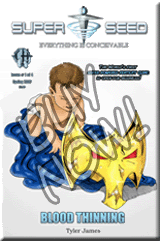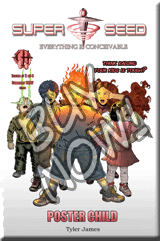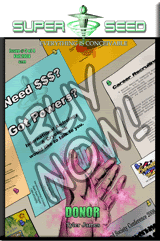 Last week, I kicked off a multi-part discussion of my creative writing process by talking about "The Great Idea." I offered that everyone has tons of great ideas, but the rare few ever bother to take the time and energy to turn them into something of value. I introduced the metaphor of the creative soul as a sponge, and offered that the very first step to making something out of that great idea is to squeeze it out of your head and into the world. Now you're ready develop that hungry idea, and to do so, you need to feed it. You feed it with research.
Last week, I kicked off a multi-part discussion of my creative writing process by talking about "The Great Idea." I offered that everyone has tons of great ideas, but the rare few ever bother to take the time and energy to turn them into something of value. I introduced the metaphor of the creative soul as a sponge, and offered that the very first step to making something out of that great idea is to squeeze it out of your head and into the world. Now you're ready develop that hungry idea, and to do so, you need to feed it. You feed it with research.II. Research is Key
So, I had a great idea for a story. The inspiration for it came from a New York Times article about a soft-spoken C.I.A. interrogator who was highly effective at getting imprisoned terrorists to divulge valuable information, without resorting to any of the brutal interrogation techniques that has outraged many Americans, and rightfully so. I thought, "Now that could be a cool character." I envisioned writing a story filled with brilliant interrogation scenes, that would explore some of the ethical dilemmas surrounding waterboarding and prisoners' rights, while a war on terror rages in the background.
I was stoked. However, that article and my excitement was only going to get me so far. Luckily, I took my own advice. I saved that article on my hard-drive, emptied my brain of all the ideas I had so far (all of four sentences), and then I took stock of what I had, and what I needed to get. I had my great idea, and a template from which to build my main protagonist. Beyond that, all I had were a whole lot of questions. It was time to do my research.
Syd Field, a noted screenwriter and scholar wrote the following of research:
Research gives you ideas, a sense of people, situations, and locale. It allows you to gain a degree of confidence so you are always on top of your subjects, operating from choice, not necessity or ignorance.
That's exactly what I was looking for. If I was going to create a story in this world, one very foreign to me, I needed to learn all I could about the people who do such work, and the places they do it. While the connotations of research suggest something less than fun, and having worked for several years as a researcher for a large social services non-profit I tend to agree, in this case it shouldn't be like pulling teeth. You're about to spend some time learning more about a subject you're extremely captivated by...otherwise, you wouldn't recognize it as a great idea and be compelled to write about it in the first place!
Before we get into the hows of research, I want to talk a bit more about the whys. The fact is, all writing for public consumption requires research. It's that simple. And it doesn't matter how intimate with the subject matter you are. Hell, if you were writing your own autobiography, you'd still need to do research. Sure, you could write a good chunk of a book about you with just the stuff in your brain. But eventually, you'd need more if you wanted it to be at all accurate and interesting. You'd interview your parents about what you were like as a kid, go through your old high school yearbooks, or early performance reviews at work, watch old videos, look at pictures from your past...that all counts as research.
But most of us won't be writing stories starring ourselves, because frankly, most of our lives just aren't that exciting. (Sad, but true.) I heard that some movie studios won't even read scripts from amateur writers that feature a writer as the main protagonist. The thought there is that this writer is simply writing himself and was too lazy to do the research to flesh out a protagonist with a cool job. No, most of us will be writing stories featuring characters far more interesting than ourselves. To develop those characters and their worlds accurately, you need to research.
Of course, you could just avoid the whole research part. Lord knows I've done stories without doing any. Some of them, were even pretty okay. If pretty okay is what you're striving for, by all means, just start writing. For me however, the time for just hopping into a story with a loose collection of ideas, is over. I'm investing too much time, effort, (and yes, money) into my projects to do them that disservice.
What does a story that hasn't been researched look like? Generally, it'll take place in a generic world that seems vaguely familiar to two or three settings from popular movies or books you've read. The characters will seem shallow and inconsistent, and as a reader, you just won't care about them, no matter how cool the situations they get into. And it's even worse as a writer. You might get off to a blazing start, but somewhere in the middle, find yourself stuck in a poorly conceived plot point. Chances that you'll abandon the project are very high.
So, hopefully, I've swayed you to the merits of research. But what now? Where do you go from here? Maybe high school or college was a long time ago, and it's been a while since you've done any research. Here are some ways to get you started.
1. Start with yourself.
Before you go whole hog into this research project, first take a mental inventory of the resources you already have that you can apply to your great idea. After all, this great idea probably was inspired in some part by the things you've read, places you've been, or people you've known. Spend a little time doing a self-assessment of anything in your life that might be applicable. Writing a fantasy story? Pull out the fantasy books on your shelves, and movies from your DVD collection. Writing a police drama? Flip through your address book and see if you know any cops. Imagining a big scene taking place in China? Time to dust off that photo album of your trip to Beijing. Trust me, no matter the story, it's in your head for a reason. Spend a little time figuring out why, and pulling out those materials that will help you develop it further.
In developing my idea about the interrogator, I rifled through my back issues of Time Magazine, and pulled out several relevant articles to interrogation and the war on terror written over the past year. I also took note of the people I know who had some relevant experience, including a federal agent who's conducted many interrogations, and a friend who works in national security.
2. The library is your friend.
I'm sure many of you never stepped foot in the library while in college. To suggest heading there of your own free will might seem a sacrilidge. But the library is a tremendous resource. I'd recommend hitting it prior to doing internet research, even, because there's a power to walking out with a stack of books that clicking links and saving pages just doesn't have.
Before walking into a library, I recommend taking two steps. First, write down a series of questions you don't know the answer to that you feel would better inform your story. For my story, I had plenty. (Who was in charge of interrogating Al Qaeda- the CIA, the military, FBI, all three? How does one become an interrogator? What was GITMO really like? How can you tell when someone is lying to you?, etc.) Once you have a decent sized list, your next step is to boil that list down to some key words (interrogator, interrogation techniques, body language, etc.) Now you're ready to head to your library.
I fully realize that, for whatever reason, there are many of you who will adamently resist taking this step. You do it all on the computer these days. You watch your TV shows, download your music and movies, keep in touch with your friends, hell, you haven't made an actual new friend in years but you've added plenty on MySpace. So, why the hell wouldn't you do all your research on the net, too? If this is you, then humor me. What I want you to do is find your locale library's website. Search their catalog online and pump in all your keywords. Flag the books that look like they could help answer your questions. If you happen to have a library card, you can put in a request for all those book. This is what I do. I find all the books I want to check out online, put in a request, and a few days later, I get an email telling me they're ready to pick up at the front desk. I'm in and out of the library in a minute with all the books I need. Now I'm free to head back to my computer, and skim them, while watching YouTube videos, of course.
3.) Yes, the internet is your friend, too.
We live in an incredible age. Today, it is far more valuable to be someone who can find the answers, than someone who knows the answers. The internet is the reason for that. Don't get me wrong, you COULD do all your research for most of the stories you want to tell entirely on the net. I just don't think it's the most efficient way. It bears repeating, there's some psychological effect to a stack of books on your desk about a subject you've committed to studying. It's a visual reminder that says, "Hey, you should be reading," that your computer will never provide. The books also are more thoroughly researched and probably better organized and index than the World Wide Web.
But the Web is awesome. Hell, in most cases, half your research could be done exclusively on Wikipedia, which is, despite it's many drawbacks, the most comprehensive and most accurate, encyclopedia on the planet. Most newspapers have extensive online catalogs of their articles. You can Google anything. But I'd encourage you to go even deeper, as the web can give you access to communities you'd never have entry to in real life.
Case in point, the upcoming fourth issue of Super Seed features a character who is a surrogate mother with post-pardem depression. I located a few message boards and forums for both surrogate mothers and intended parents to really get a strong sense of what some of these women were like, and what kind of emotional issues they were going through. For my comic about the interrogator, I subscribed to several blogs that discuss related issues, including one kept by an interrogator. The net can be a tremendous resource for adding truth to your work.
I'm going to stop with three research resources. There are plenty of others, but again, this is a series on MY writing process, not the ideal one. I should read one or more newspapers cover to cover everyday, but I don't. I should identify strangers with a strong knowledge of the subject matter I'm interested in and bug them for interviews, but I haven't. (I do plan on talking to a few small press publishers at New York Comic Con as research for a character in one of my stories that I'm having trouble fleshing out, however. I'll let you know how that goes.) But I guarantee you, if you spend 2-3 weeks doing these three things, taking a mental inventory of resources you already have, hitting your library to make this project official, and working the web, you'll be flush with material to soak up that will help that great idea grow.
Two warnings when it comes to research:
1.) Set a limit. The amount of information out there is limitless. Even the most obscure topics could be researched from now until the end of your days. This will not help you write your story. So set a limit for yourself. Give yourself three weeks or so to research your topic. Determine to read two books on your subject, and subscribe to two relevant blogs and a message board. This will not be the end of your research for the duration of the project. The more you know, the more you'll want to know. The goal of this first research phase is not to become a PhD in your subject, but to familiarize yourself with it. At the end of the day, your goal is not to become an expert, but to write a damn good story that an actual expert could pick up and think, "Nice. This guy got that right."
2.) Research can't replace creativity. I can't stress this enough. Sometimes when you start researching things, you'll be tempted to turn your story into a series of facts and figures, you know, to prove you did your homework. That's not the goal of research. That's just annoying and bad storytelling. Research is not a substitute for creativity, rather it is fuel for it.
Here's an illustration. In researching the interrogation story, I was captivated reading about a daring prison break in Afghanistan that released more than a hundred Taliban soldiers being held by the Afghani military in June, 2008. I thought that would be a perfect way to introduce my main antagonist, and that perhaps in my story, releasing him was one of the main reasons for the prison break. So, I did more research, found out how the attackers freed the prisoners (truck bomb that blew open the gate, and an attacking force on motorcycles with machine guns.) Now that's some visual and creative fuel. It gave me a start, but the rest of the scene, I wrote to satisfy the needs of my story, not the facts.
So, that's my take on research. After completing your initial research, you'll find you're a full sponge of ideas once more. You're going to wring that sponge again, only this time in a more focused way, and that'll be the focus of my next article in this series.
NEXT: III. A Killer Pitch












3 comments:
A thorough article! I am really enjoying this series. I love doing research as well, but it depends on the story I am doing. I was writing a horror story that revovled around Nazi interest in the arcane/ supernatural in World War II. I did heaps of online and off line research for that one, but due to the dark subject matter, I have put the story to one side.
Even for my light hearted phayrie stories I have done research on medieval castles, on fairy myth (particularly Celtic myth), etc.
I do try to create much of the worlds I operate in wholly on my own without too much outside interference, but I often draw on other sources for inspiration.
Another source I use for research is other art work; it inspires me and I can look at someone else's picture and develop my own ideas about what they have drawn and how that applies to my own story. I am looking at a lot of work by Brian Froud for my phayrie story...
Good luck with the surrogate with postpartum. The ones that have it keep mum, as the message boards are notorious for bashing them, "How could you have been a surrogate if you think you will regret it?" blah blah blah.
And its hard for any surrogate that regrets her decision to share with anyone....too much "I told you so".
Hope this helps! More info on surrogacy: http://www.information-on-surrogacy.com
May help with your research.
i liked reading it a lot too, useful and interesting stuff, Tyler.
Post a Comment